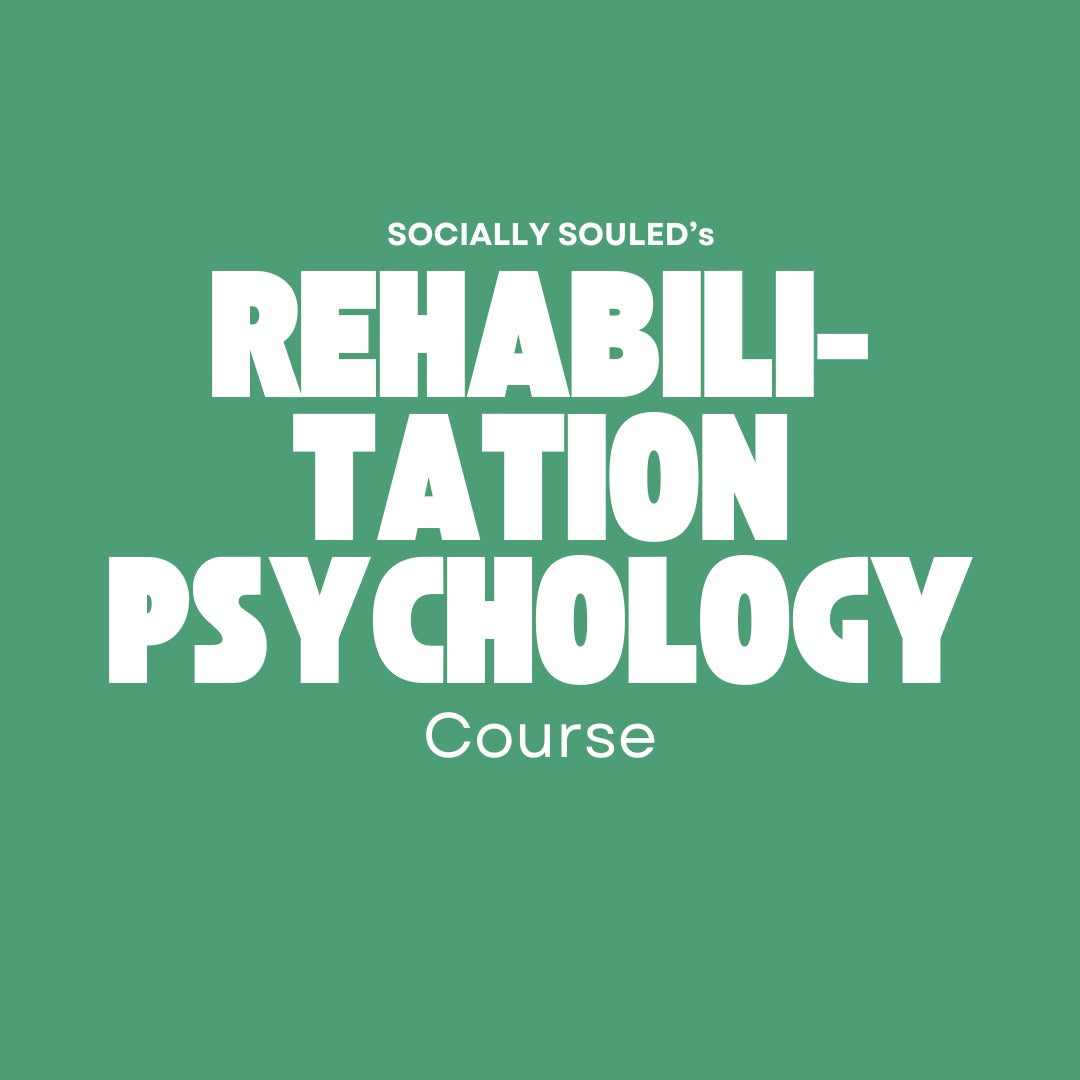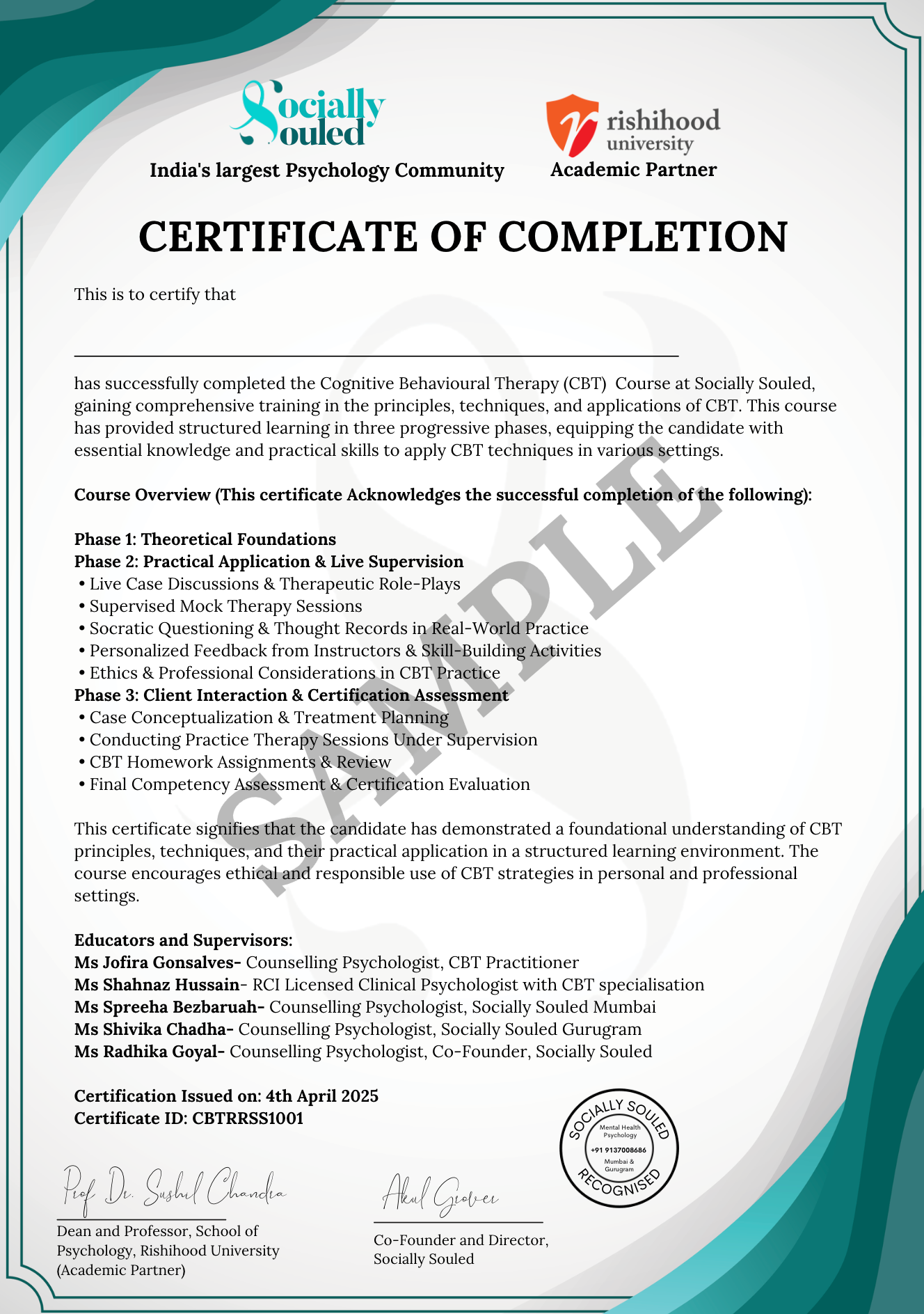
Rehabilitation Counselling
Course Modules
-
Introduction to Rehabilitation Psychology
Learn the Theory -
Applying Skills in Real- World Settings
Gain Expereiences -
Psychological Assessment in Rehabilitation
Practice the Skills
Takeaways that students took
Topics Covered:
- Introduction to Rehabilitation PsychologyUnderstand the field, history, and significance of rehabilitation psychology.
- Working with Special Populations,Learn to address diverse needs with empathy and professionalism.
- Biopsychosocial Model in RehabilitationLearn how biological, psychological, and social factors interact to influence recovery.
- Family and Caregiver Support, Learn strategies to enhance communication, support, and collaboration in the rehabilitation process.
- Psychological Assessment in RehabilitationStudy tools and techniques for assessing cognitive, emotional, and behavioral functioning.
- Vocational Rehabilitation and Social Reintegration,Explore methods to promote independence and social functioning.
- Coping, Adjustment, and Resilience, Learn resilience-building techniques for patients and caregivers.
- Applied Rehabilitation Psychology in Real-World Settings
- Intervention Strategies and Techniques,Learn to design and implement individualised rehabilitation plans.

Educators & Supervisors
Ms Spreeha Bezbaruah- Counselling Psychologist, Socially Souled Mumbai
Ms Shivika Chadha- Counselling Psychologist, Socially Souled Gurugram
Ms Radhika Goyal- Counselling Psychologist, Co-Founder, Socially Souled
Supervised Practice & Certification Requirements:
- Conduct 5 Therapy Sessions with Clients (Live or Simulated).
- Submit Session Notes & Case Reports for Trainer Evaluation.
- Develop a Treatment Plan & Case Conceptualization.
- Participate in Supervision Calls & Peer Reviews.
- Pass the Final Competency Assessment for Certification.
Sample Certificate and it's applications:
Deepen Your Expertise in Therapy & Counseling
Build a Strong Foundation for Advanced Studies & Practice
Work Alongside Licensed Therapists in Mental Health Settings

Enhance Coaching, Education & Mental Wellness Initiatives
Facilitate Mental Health Workshops & Community Sessions
Apply CBT in Everyday Life & Career Growth

What You Get with This Rehabilitation Training Program
- Comprehensive Learning in 3 Phases – Theory, Practical Training & Real-World Application.
- Access to LMS with Downloadable Rehabilitation Workbooks
- Live Training with Role-Plays, Case Discussions & Q&A Sessions.
- Hands-On Supervised Therapy Practice with Real Clients.
- Mentorship & Support from Industry Experts.
- Official Certification Recognized for Career Growth.
Takeaways that students took
Who is This Course For?
-
Psychology Students and Graduates
Looking for practical training. -
Counselors & Mental Health Professionals
Wanting to enhance their therapeutic skills. -
Social Workers and Educators
Applying Rehabilitation principles and techniques in community settings. -
Anyone Interested in Health Psych
Seeking structured training to understand and apply techniques.
Frequently Asked Questions (FAQs)
-
Students, psychologists, counselors, healthcare professionals, and anyone interested in understanding rehabilitation, disability, and supportive mental health interventions.
-
No, the course is beginner-friendly, though it also provides advanced insights for professionals in clinical or healthcare settings.
-
The course covers psychological aspects of disability, chronic illness, injury recovery, adaptive strategies, rehabilitation interventions, patient motivation, and community reintegration.
-
Yes, the course is designed to provide you with actionable skills and techniques that can be immediately implemented in your clinical practice. Case studies, role-playing, and interactive sessions facilitate hands-on learning that ensures you can apply the concepts effectively.
-
It combines theory with applied exercises, case studies, and real-life examples of rehabilitation psychology in clinical and community settings.
-
Absolutely. Participants gain skills useful for careers in clinical psychology, counseling, occupational therapy, rehabilitation centers, and healthcare support services.








